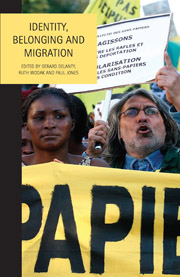Book contents
- Frontmatter
- Contents
- Acknowledgements
- List of Figures
- Notes on Contributors
- Introduction: Migration, Discrimination and Belonging in Europe
- I Theoretical Perspectives on Belonging
- II Institutional Forms of Discrimination
- III Cases of Belonging and Exclusion
- 11 Symbolic Violence
- 12 Voices of Migrants: Solidarity and Resistance
- 13 Transformations of ‘Dutchness’: From Happy Multiculturalism to the Crisis of Dutch Liberalism
- 14 Competent vs. Incompetent Students: Polarization and Social Closure in Madrid Schools
- Conclusion: Discrimination as a Modern European Legacy
- Index
14 - Competent vs. Incompetent Students: Polarization and Social Closure in Madrid Schools
from III - Cases of Belonging and Exclusion
- Frontmatter
- Contents
- Acknowledgements
- List of Figures
- Notes on Contributors
- Introduction: Migration, Discrimination and Belonging in Europe
- I Theoretical Perspectives on Belonging
- II Institutional Forms of Discrimination
- III Cases of Belonging and Exclusion
- 11 Symbolic Violence
- 12 Voices of Migrants: Solidarity and Resistance
- 13 Transformations of ‘Dutchness’: From Happy Multiculturalism to the Crisis of Dutch Liberalism
- 14 Competent vs. Incompetent Students: Polarization and Social Closure in Madrid Schools
- Conclusion: Discrimination as a Modern European Legacy
- Index
Summary
However, the so-called marginalized, who are none other than the oppressed, were never outside. They were always inside. Inside the structure that turns them into ‘beings for others’. Their solution, then, does not lie in ‘integrating’ them, ‘incorporating’ them into this structure that oppresses them, but rather in transforming it so that they can become ‘beings for themselves’.
Freire 1970: 80An Ethnographic Perspective
In the last fifteen years, the Autonomous Region of Madrid, previously a traditional destination for immigration from other Spanish communities, has become one of the preferred destinations for workers coming from other countries, principally (and in this order) from Ecuador, Colombia, Romania, Peru, Morocco, Bolivia, China and the Dominican Republic. According to data from the City Council (‘Ayuntamiento’) of Madrid, students from migrant backgrounds represent about 15% of the total school population, a figure that in the city centre reaches 34% (see the Plan Madrid de Convivencia Social e Intercultural [Madrid Plan for Social and Intercultural Co-existence] 2005).
The analysis of ideologies presented in this article is supported by data collected during two research studies carried out in schools of the Autonomous Region of Madrid (‘Comunidad de Madrid’), which observed how ideologies affect classroom management and the processes of teaching and learning. An answer to how to address diversity in the classroom appears to be related to correlative questions, in particular, what is considered to be legitimate knowledge, who is considered to be a ‘normal’ student and a ‘good’ or ‘competent’ student, and what is the legitimate language of exchange.
- Type
- Chapter
- Information
- Identity, Belonging and Migration , pp. 279 - 300Publisher: Liverpool University PressPrint publication year: 2011



